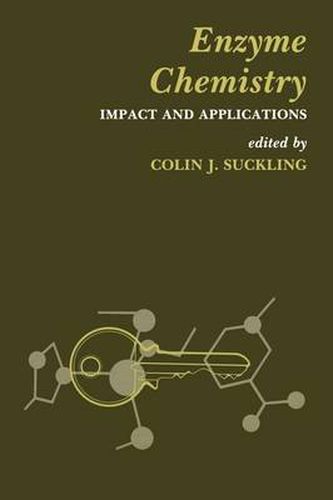Readings Newsletter
Become a Readings Member to make your shopping experience even easier.
Sign in or sign up for free!
You’re not far away from qualifying for FREE standard shipping within Australia
You’ve qualified for FREE standard shipping within Australia
The cart is loading…






This title is printed to order. This book may have been self-published. If so, we cannot guarantee the quality of the content. In the main most books will have gone through the editing process however some may not. We therefore suggest that you be aware of this before ordering this book. If in doubt check either the author or publisher’s details as we are unable to accept any returns unless they are faulty. Please contact us if you have any questions.
In the molecular sciences, enzyme chemistry occupies a special niche as one of the major contact points between chemical and biological disciplines. The special properties of enzymes as selective and efficient catalysts are so central to current challenges to chemists that the development of enzyme chemistry in the past thirty years has been a major stimulus to chemical research in general. On the one hand studies of the intrinsic properties of enzymes and, on the other hand, their applications to synthesis, drug design, and biosynthesis have had an immense impact. This book brings together in one volume essays describing several such fields with emphasis on the applications. It would be unnecessarily repetitious to outline the approach and contents of the book in a Preface; the first short chapter is more eloquent than a formal Preface can be. I shall therefore encourage you to begin with the Introduction in Chapter 1 and here I wish to extend my warm thanks to those who have contributed to the production of this book: the authors for their acceptance of the overall concept of the book and for the thoughtfulness of their writing; Dr Charles Suckling, FRS and Professor Hamish Wood for their constructive criticism of the whole book; and Dr John Buckingham and his colleagues at Chapman and Hall for their efficiency and enthusiasm in transforming the typescripts into the book that you now hold. Colin J. Suckling University of Strathclyde Contributors Donald H.
$9.00 standard shipping within Australia
FREE standard shipping within Australia for orders over $100.00
Express & International shipping calculated at checkout
This title is printed to order. This book may have been self-published. If so, we cannot guarantee the quality of the content. In the main most books will have gone through the editing process however some may not. We therefore suggest that you be aware of this before ordering this book. If in doubt check either the author or publisher’s details as we are unable to accept any returns unless they are faulty. Please contact us if you have any questions.
In the molecular sciences, enzyme chemistry occupies a special niche as one of the major contact points between chemical and biological disciplines. The special properties of enzymes as selective and efficient catalysts are so central to current challenges to chemists that the development of enzyme chemistry in the past thirty years has been a major stimulus to chemical research in general. On the one hand studies of the intrinsic properties of enzymes and, on the other hand, their applications to synthesis, drug design, and biosynthesis have had an immense impact. This book brings together in one volume essays describing several such fields with emphasis on the applications. It would be unnecessarily repetitious to outline the approach and contents of the book in a Preface; the first short chapter is more eloquent than a formal Preface can be. I shall therefore encourage you to begin with the Introduction in Chapter 1 and here I wish to extend my warm thanks to those who have contributed to the production of this book: the authors for their acceptance of the overall concept of the book and for the thoughtfulness of their writing; Dr Charles Suckling, FRS and Professor Hamish Wood for their constructive criticism of the whole book; and Dr John Buckingham and his colleagues at Chapman and Hall for their efficiency and enthusiasm in transforming the typescripts into the book that you now hold. Colin J. Suckling University of Strathclyde Contributors Donald H.